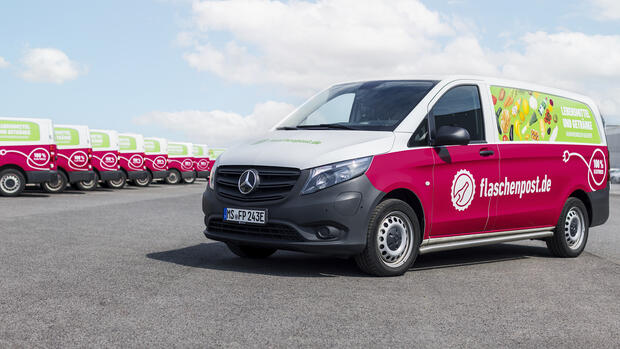Dusseldorf The delivery service Flaschenpost still delivers most of its goods in diesel vehicles. Only 300 of the online drinks retailer’s 2,300 delivery vans are powered by electricity. But that should soon be a thing of the past.
The company, which belongs to the Oetker Group, has now purchased 1,000 electric delivery vans from the manufacturers Mercedes, Citroën and Opel, as Flaschenpost announced on Monday. They are to gradually replace vehicles with combustion engines.
A charging infrastructure is currently being set up at all 33 storage locations. Because by the end of this year, half of all tours should be done electrically. At some locations, including Münster and two warehouses in Berlin, the fleet is to be completely converted this year. The company’s plans go even further.
The two heads of Flaschenpost, Christopher Huesmann and Niklas Plath, have a clear goal. By 2030, they want to reduce the company’s CO2 emissions by 42 percent, which were 30,800 tons in 2021. For this reason, all diesel vehicles are to be phased out in the medium term, and new combustion engines will no longer be purchased.
In view of the high growth rate that the delivery service is presenting, this is not so easy. The company reported sales of EUR 93 million for 2019. It should now be more than 300 million euros.
The company no longer gives exact figures since it was taken over by the Radeberger Group, which belongs to Oetker, in December 2020 and is subsumed under “other interests” in the Oetker annual report. The turnover of this business area jumped from 592 to 900 million euros in 2021. “This sales growth was primarily driven by the digital business models, above all the message in a bottle,” says the annual report of Dr. August Oetker KG.
Flaschenpost is one of the pioneers in the delivery business. The company was founded in 2012 by entrepreneur Dieter Büchl in Münster. After changing its name to a stock corporation, Büchl withdrew to the supervisory board in 2018.
According to industry circles, Oetker is said to have paid almost one billion euros for the takeover, but a purchase price was never officially named. Shortly after the purchase, Oetker incorporated its own Durstexpress delivery service into Flaschenpost. According to the food, indulgence and restaurants union (NGG), this cost several hundred jobs.
The state supports the conversion of the message in a bottle with 7.6 million euros
But meanwhile, in view of the nationwide growth, the message in a bottle is more about increasing the workforce. The company employs around 20,000 people in administration, logistics and delivery. Shortly before the takeover by Oetker, there were only 7,000.
“The purchase of 1000 electric vehicles is an important milestone in achieving our climate goals,” explains Stephan Zech, Head of Fleet Management at Flaschenpost. A particular difficulty here is setting up the charging infrastructure. The company reports waiting times due to delivery bottlenecks for electronic components and problems with the availability of electricity at some locations.
“Without the support of the project partners, we would not have been able to master these challenges,” says Zech. The plan is to switch completely to electric vehicles. Because of the difficult situation in expanding the infrastructure, the company does not want to give a date for this.
Setting up the charging infrastructure is becoming a particular challenge.
(Photo: message in a bottle)
The company does not reveal the total investment. However, Flaschenpost may have spent a good double-digit million amount on the vehicles alone. In addition, there are charging stations at all warehouses.
However, the Federal Ministry for Digital and Transport bears part of it. This promotes the conversion with 7.6 million euros as part of the “Guideline on the promotion of light and heavy commercial vehicles with alternative, climate-friendly drives and the associated tank and charging infrastructure”.
Picnic already delivers exclusively with electric vehicles
The pressure to convert comes from the market. According to a survey by the digital association Bitkom, 59 percent of online customers would like delivery by electric vehicle. Bottle mail is also delivering food in addition to crates of drinks at more and more locations. And so the company is in competition with delivery services, which are also massively switching to electromobility.
First and foremost is the Dutch start-up Picnic, which delivers in large parts of North Rhine-Westphalia and recently also in Hamburg. It only operates electric delivery vans that it has had specially developed for its application. The delivery service Knuspr only uses electric cars and gas-powered vehicles and is in the process of converting completely to electromobility.
The Dutch start-up relies exclusively on electric vehicles.
(Photo: IMAGO/snowfieldphotography)
Market leader Rewe is in the test phase for electromobility. “We are currently testing various delivery concepts for the Rewe delivery service, such as electric vans, small electric vehicles and cargo bikes,” said a spokeswoman when asked. “After evaluating the test phase, further expansion of individual concepts will be considered.” Hydrogen drives are also being tested in individual regions.
>> Read also: reweInterview with boss Lionel Souque: “That’s why we’re investing in the Flink delivery service”
Customers can also contribute to more sustainability by choosing the delivery window. With both Knuspr and Flaschenpost, customers can see at what times deliveries to their neighborhood are already planned. If you choose these times, the tours can be bundled and the distances traveled can be reduced.
More: Start-ups are struggling like gorillas – supermarkets are expanding with delivery services.
